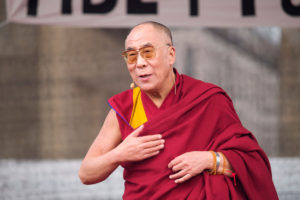By Nilova Roychaudhury
The Dalai Lama’s visit to Northeast India’s Arunachal Pradesh state has sparked a fresh round of India-China diplomatic tensions, with Beijing threatening “serious” consequences and New Delhi asserting that the visit was a “purely religious” one with no political motives.
India also asked China not to interfere in its internal affairs.
The Dalai Lama’s week-long visit is likely to further vitiate political ties between Beijing and New Delhi, which is seething over China’s persistent opposition to India’s efforts to join the Nuclear Suppliers Group (NSG) and refusal to get Masood Azhar, head of the Jaish-e-Mohammed, which India considers a terrorist group, proscribed as an international terrorist at the UN.
India is also opposed to the China Pakistan Economic Corridor (CPEC) which it claims runs through territory that is Indian, although there are voices in Kashmir who support the idea as being beneficial to opening up the troubled state to trade with Central Asia and beyond.
While the Dalai Lama’s visit to Arunachal Pradesh was planned months ago, it fits in well as a clear sign of Indian displeasure with Chinese political stances favouring Pakistan. The Indian government chose to not discourage the Tibetan religious leader’s plans to visit the state as a clear signal to China that it would not be cowed down by Beijing’s threats.
Subrahmanyam Jaishankar, India’s Foreign Secretary, visited Beijing in February to try and ease tensions between the Asian neighbours. Finding little salience there for India’s sensitivities, and despite dire threats in the state-owned Chinese media of “serious consequences” if the Dalai Lama visited Arunachal Pradesh, which China claims is ‘South Tibet,’ New Delhi gave Tibetan Buddhism’s highest spiritual leader the green light for his visit.
Kiren Rijiju, India’s Minister of State for Home Affairs, who is an MP from Arunachal Pradesh; whose sovereignty is contested by China which claims it as “South Tibet;” said no political motive should be attributed to Dalai Lama’s trip.
“India has always been non-interfering in the neighbours’ internal affairs,” Rijiju said. “We expect the same from our neighbours.”
“When Dalai Lamaji is in Arunachal Pradesh, he will be confined only to religious matters. He is not there to make any political statement and he is not there with any political motive,” Rijiju said.
Rijiju, who travelled to Arunachal Pradesh on Wednesday (April 5) to meet the Dalai Lama, Tibetan Buddhism’s highest spiritual leader, said India has never questioned China’s sovereignty and “has respectfully adhered to the one-China policy”.
“So we expect that China also should not interfere in our internal matters,” he said.
By calling it an internal issue for India, Rijiju and, by extension, the Indian government, is publicly questioning China’s territorial claims over the region.
“No artificial controversy should be created around his present visit,” the MEA spokesman said. “The Dalai Lama is a revered religious leader who is deeply respected by the Indian people” and has visited Arunachal Pradesh on six earlier occasions.”
The Chinese Foreign Ministry has reacted more sharply than usual to the visit, saying in a statement that “The 14th Dalai Lama is an anti-China separatist who has long lived in exile following a failed armed rebellion by the reactionary group of high-ranking feudal serf owners in Tibet in March 1959.”
“The Chinese government is resolutely opposed to any country’s support and facilitation for the 14th Dalai group’s anti-China separatist activities,” read the statement without alluding directly to India.
New Delhi feels that Beijing’s belligerence on the issue goes against the ‘Political Parameters and Guiding Principles for the Settlement of the India-China Boundary Question’ reached on April 11, 2005, which stated, “In reaching a boundary settlement, the two sides shall safeguard due interests of their settled populations in the border areas.”
The thinking is New Delhi is that Beijing will express its verbal displeasure, but will not take any steps to jeopardise the bilateral economic relationship, which is heavily skewed in favour of China. India’s expanding infrastructure requirements, for roads and bridges particularly, offer Chinese companies huge scope.
Meanwhile, the Dalai Lama, who travelled by road to Bomdila, Arunachal Pradesh, after heavy rain forced him to call off the scheduled visit by helicopter, said India, which was his “spiritual guru,” had “never” used him as “leverage” against China.
Arunachal Pradesh holds a special significance for the Tibetan leader, as it was the first territory — then called the North East Frontier Agency — he entered in India, when fleeing Chinese troops in 1959. He then stayed at the Tawang monastery, considered among Tibetan Buddhism’s holiest shrines, before moving to Dharamsala, where he now lives.
(Nilova Roychaudhury is a veteran journalist. Comments and suggestions on this article can be sent on: editor@spsindia.in)

